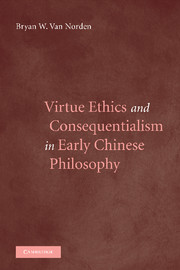3 - Mozi and Early Mohism
Published online by Cambridge University Press: 25 July 2009
Summary
When one advances claims, one must first establish a standard of assessment. To make claims in the absence of such a standard is like trying to establish on the surface of a spinning potter's wheel where the sun will rise and set. Without a fixed standard, one cannot clearly ascertain what is right and wrong or what is beneficial and harmful.
– MoziIf utility is the ultimate source of moral obligations, utility may be invoked to decide between them when their demands are incompatible…. in other systems, the moral laws all claiming independent authority, there is no common umpire entitled to interfere between them; their claims to precedence one over another rest on little better than sophistry, and, unless determined, as they generally are, by the unacknowledged influence of considerations of utility, afford a free scope for the action of personal desires and partialities.
– John Stuart MillMozi was the first person we know of in Chinese history who presented a detailed, coherent worldview that was critical of, and gave a systematic alternative to, Ruism. In place of Kongzi's cultivated ethical connoisseur, whose intuitive responsiveness cannot be captured by general rules, Mozi offers us a general algorithm for determining what is right: aim at maximizing benefits impartially.
In this chapter I shall discuss the views of early Mohism. By “early Mohism” I mean the views expressed by the “synoptic chapters” of the Mozi. (This phrase is explained in the next section.)
- Type
- Chapter
- Information
- Virtue Ethics and Consequentialism in Early Chinese Philosophy , pp. 139 - 198Publisher: Cambridge University PressPrint publication year: 2007



